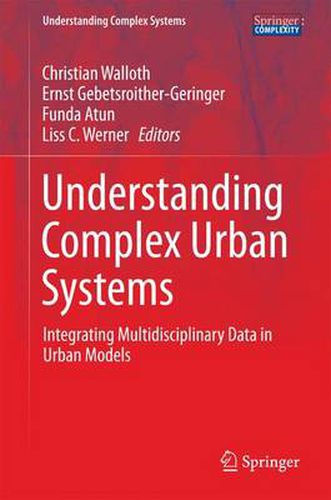Readings Newsletter
Become a Readings Member to make your shopping experience even easier.
Sign in or sign up for free!
You’re not far away from qualifying for FREE standard shipping within Australia
You’ve qualified for FREE standard shipping within Australia
The cart is loading…






This title is printed to order. This book may have been self-published. If so, we cannot guarantee the quality of the content. In the main most books will have gone through the editing process however some may not. We therefore suggest that you be aware of this before ordering this book. If in doubt check either the author or publisher’s details as we are unable to accept any returns unless they are faulty. Please contact us if you have any questions.
This book is devoted to the modeling and understanding of complex urban systems. This second volume of Understanding Complex Urban Systems focuses on the challenges of the modeling tools, concerning, e.g., the quality and quantity of data and the selection of an appropriate modeling approach. It is meant to support urban decision-makers-including municipal politicians, spatial planners, and citizen groups-in choosing an appropriate modeling approach for their particular modeling requirements. The contributors to this volume are from different disciplines, but all share the same goal: optimizing the representation of complex urban systems. They present and discuss a variety of approaches for dealing with data-availability problems and finding appropriate modeling approaches-and not only in terms of computer modeling.
The selection of articles featured in this volume reflect a broad variety of new and established modeling approaches such as:
An argument for using Big Data methods in conjunction with Agent-based Modeling;
The introduction of a participatory approach involving citizens, in order to utilize an Agent-based Modeling approach to simulate urban-growth scenarios;
A presentation of semantic modeling to enable a flexible application of modeling methods and a flexible exchange of data;
An article about a nested-systems approach to analyzing a city’s interdependent subsystems (according to these subsystems’ different velocities of change);
An article about methods that use Luhmann’s system theory to characterize cities as systems that are composed of flows;
An article that demonstrates how the Sen-Nussbaum Capabilities Approach can be used in urban systems to measure household well-being shifts that occur in response to the resettlement of urban households;
A final article that illustrates how Adaptive Cycles of Complex Adaptive Systems, as well as innovation, can be applied to gain a better understanding of cities and to promote more resilient and more sustainable urban futures.
$9.00 standard shipping within Australia
FREE standard shipping within Australia for orders over $100.00
Express & International shipping calculated at checkout
This title is printed to order. This book may have been self-published. If so, we cannot guarantee the quality of the content. In the main most books will have gone through the editing process however some may not. We therefore suggest that you be aware of this before ordering this book. If in doubt check either the author or publisher’s details as we are unable to accept any returns unless they are faulty. Please contact us if you have any questions.
This book is devoted to the modeling and understanding of complex urban systems. This second volume of Understanding Complex Urban Systems focuses on the challenges of the modeling tools, concerning, e.g., the quality and quantity of data and the selection of an appropriate modeling approach. It is meant to support urban decision-makers-including municipal politicians, spatial planners, and citizen groups-in choosing an appropriate modeling approach for their particular modeling requirements. The contributors to this volume are from different disciplines, but all share the same goal: optimizing the representation of complex urban systems. They present and discuss a variety of approaches for dealing with data-availability problems and finding appropriate modeling approaches-and not only in terms of computer modeling.
The selection of articles featured in this volume reflect a broad variety of new and established modeling approaches such as:
An argument for using Big Data methods in conjunction with Agent-based Modeling;
The introduction of a participatory approach involving citizens, in order to utilize an Agent-based Modeling approach to simulate urban-growth scenarios;
A presentation of semantic modeling to enable a flexible application of modeling methods and a flexible exchange of data;
An article about a nested-systems approach to analyzing a city’s interdependent subsystems (according to these subsystems’ different velocities of change);
An article about methods that use Luhmann’s system theory to characterize cities as systems that are composed of flows;
An article that demonstrates how the Sen-Nussbaum Capabilities Approach can be used in urban systems to measure household well-being shifts that occur in response to the resettlement of urban households;
A final article that illustrates how Adaptive Cycles of Complex Adaptive Systems, as well as innovation, can be applied to gain a better understanding of cities and to promote more resilient and more sustainable urban futures.